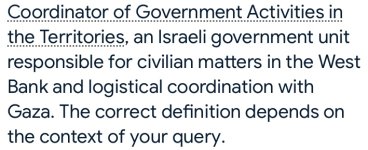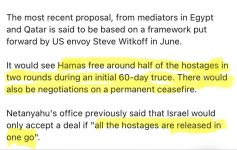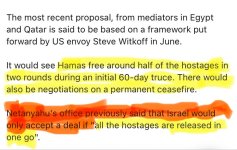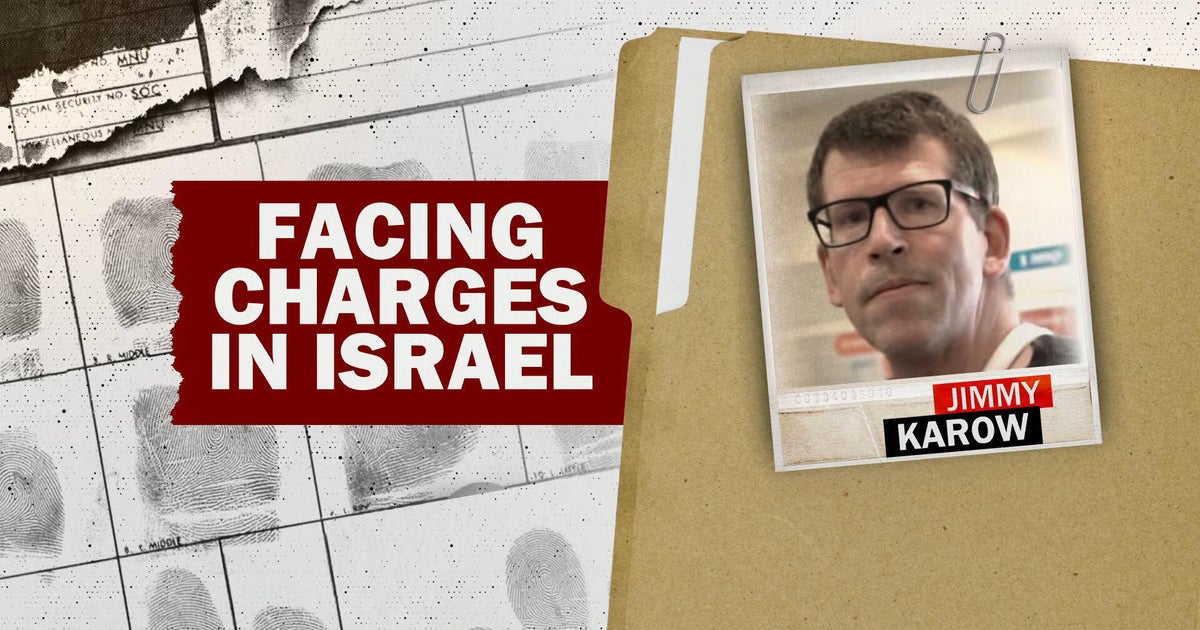Hamas attacks Israel
- Thread starter Serryah
- Start date
You are using an out of date browser. It may not display this or other websites correctly.
You should upgrade or use an alternative browser.
You should upgrade or use an alternative browser.
Terrorism continues...
Israeli military uproots thousands of Palestinian olive trees in West Bank
Israeli destruction in al-Mughayyir near Ramallah is part of push to forcibly displace Palestinians, researcher says.
23 Aug 2025
The Israeli military has destroyed about 3,000 olive trees in a village near Ramallah in the occupied West Bank, the head of the local council says, as Palestinians face a continued wave of violence across the territory in the shadow of Israel’s war on Gaza.
The Israeli military issued an order to uproot olive trees in a 0.27sq-km (0.1sq-mile) area in al-Mughayyir, a village of about 4,000 residents northeast of Ramallah.
The army justified the measure by saying the trees posed a “security threat” to a main Israeli settlement road that runs through the village’s lands.
The destruction was carried out as al-Mughayyir has been under lockdown since Thursday after an Israeli settler said he was shot at in the area.
Israeli military uproots thousands of Palestinian olive trees in West Bank
Israeli destruction in al-Mughayyir near Ramallah is part of push to forcibly displace Palestinians, researcher says.
23 Aug 2025
The Israeli military has destroyed about 3,000 olive trees in a village near Ramallah in the occupied West Bank, the head of the local council says, as Palestinians face a continued wave of violence across the territory in the shadow of Israel’s war on Gaza.
The Israeli military issued an order to uproot olive trees in a 0.27sq-km (0.1sq-mile) area in al-Mughayyir, a village of about 4,000 residents northeast of Ramallah.
The army justified the measure by saying the trees posed a “security threat” to a main Israeli settlement road that runs through the village’s lands.
The destruction was carried out as al-Mughayyir has been under lockdown since Thursday after an Israeli settler said he was shot at in the area.

US sergeant says he is under investigation for sharing anti-Israel social media posts
"Since when does not supporting a foreign nation get a US soldier investigated for being a threat to national security?"US Army Sergeant Jonathan Estridge, a...
For too many around the world, Israel’s war with Hamas is viewed through a lens of moral simplicity: Enough. End the fighting. Bring relief to the people of Gaza. Accept a ceasefire — any ceasefire. Do the “right” thing.All the Holocaustages released at one time & Hamas disarms & whatever governing body takes over Gaza, it’s not Hamas (& they aren’t keen on the PA either). They sound pretty clear and concise about this also.
Forget that 50 hostages remain in Gaza. Forget that Hamas vows to repeat October 7. Forget that this week marks one year since six hostages were murdered in captivity — killed in cold blood after yet another round of failed negotiations.
Israel is navigating a maze of impossible decisions with no clean exits, only devastating trade-offs. Consider the latest ceasefire proposal. After months of failed talks — and with Israel poised to capture Gaza City — Hamas now says it’s open to a deal brokered by Egypt, Qatar, and the United States. The terms: a 60-day pause in fighting, partial Israeli withdrawal, and the release of only half the surviving hostages?All the Holocaustages released at one time & Hamas disarms & whatever governing body takes over Gaza, it’s not Hamas (& they aren’t keen on the PA either). They sound pretty clear and concise about this also.
Israel is being told that unless it allows some of its citizens to remain underground, and unless it leaves a terrorist organization standing, it will be punished with a unilateral move that grants that very group global legitimacy. Nevertheless, several Western governments, including Canada, have threatened to recognize a Palestinian state if Israel refuses the deal.
What other Western democracy-ish would accept such terms? Hamas has been given numerous chances to end the war, and with it, the humanitarian disaster in Gaza. But it is singularly interested in survival — their survival, not that of those they claim to represent.
Every proposal, every delay, every hostage still held is a bargaining chip to extract concessions, claim victory, and live to fight another day. But it is Israel which is pilloried for intransigence across the international community. Critics insist Hamas cannot be defeated.
But Hamas today is weaker, more isolated, and less capable than it was on October 6. The real question is not whether Hamas can be broken, but why the world is prepared to let it survive — likely guaranteeing yet another cycle of violence.You can't disarm an ideology.
It is also worth recalling that Hamas is not only Israel’s problem. Arab states like Saudi Arabia, the UAE, and Morocco have long regarded Hamas as a dangerous branch of the Muslim Brotherhood, backed by Iran, and a threat to their own stability. They may issue public rebukes, but privately many hope Israel succeeds in breaking Hamas.
What many Western critics miss is the sheer impossibility of Israel’s position. Trading withdrawal for hostages would embolden Hamas and jeopardize the chance of regional normalization with Saudi Arabia. It would signal weakness in a region where, as history shows, peace follows strength — never humiliation.
But what is the alternative? To tell the families of hostages that grand strategy must come before their loved ones’ salvation?
Israel is walking an impossible tightrope — between rescuing lives today and securing its future tomorrow. Between bringing home its hostages and ensuring none are ever taken again. These are not abstract dilemmas. They are decisions that come with names, faces, and funerals.
There are no good options left for Israel — only unbearable ones.
Aviva Klompas: There are no good choices for Israel. Only unbearable ones — National Post
This is no longer a conflict defined by a simple right and wrong. It is a grinding moral crucible in which every path leads to pain
Zionists already lost months ago. Israel Gov't doesn't care about holocaustages. Holocaust guiltwashing dies with the remaining few Gen X too blinded by Muzzie hate to shake shit off. Who is going to buy their sabra hummus? Who is going to feed Israel when sanctions hit? Who is going to take their refugees when unstoppable Iranian missile come flying in by the hundreds. Who will cry for them? Nobody.For too many around the world, Israel’s war with Hamas is viewed through a lens of moral simplicity: Enough. End the fighting. Bring relief to the people of Gaza. Accept a ceasefire — any ceasefire. Do the “right” thing.
Forget that 50 hostages remain in Gaza. Forget that Hamas vows to repeat October 7. Forget that this week marks one year since six hostages were murdered in captivity — killed in cold blood after yet another round of failed negotiations.
Israel is navigating a maze of impossible decisions with no clean exits, only devastating trade-offs. Consider the latest ceasefire proposal. After months of failed talks — and with Israel poised to capture Gaza City — Hamas now says it’s open to a deal brokered by Egypt, Qatar, and the United States. The terms: a 60-day pause in fighting, partial Israeli withdrawal, and the release of only half the surviving hostages?
Israel is being told that unless it allows some of its citizens to remain underground, and unless it leaves a terrorist organization standing, it will be punished with a unilateral move that grants that very group global legitimacy. Nevertheless, several Western governments, including Canada, have threatened to recognize a Palestinian state if Israel refuses the deal.
What other Western democracy-ish would accept such terms? Hamas has been given numerous chances to end the war, and with it, the humanitarian disaster in Gaza. But it is singularly interested in survival — their survival, not that of those they claim to represent.
Every proposal, every delay, every hostage still held is a bargaining chip to extract concessions, claim victory, and live to fight another day. But it is Israel which is pilloried for intransigence across the international community. Critics insist Hamas cannot be defeated.
But Hamas today is weaker, more isolated, and less capable than it was on October 6. The real question is not whether Hamas can be broken, but why the world is prepared to let it survive — likely guaranteeing yet another cycle of violence.
It is also worth recalling that Hamas is not only Israel’s problem. Arab states like Saudi Arabia, the UAE, and Morocco have long regarded Hamas as a dangerous branch of the Muslim Brotherhood, backed by Iran, and a threat to their own stability. They may issue public rebukes, but privately many hope Israel succeeds in breaking Hamas.
What many Western critics miss is the sheer impossibility of Israel’s position. Trading withdrawal for hostages would embolden Hamas and jeopardize the chance of regional normalization with Saudi Arabia. It would signal weakness in a region where, as history shows, peace follows strength — never humiliation.
But what is the alternative? To tell the families of hostages that grand strategy must come before their loved ones’ salvation?
Israel is walking an impossible tightrope — between rescuing lives today and securing its future tomorrow. Between bringing home its hostages and ensuring none are ever taken again. These are not abstract dilemmas. They are decisions that come with names, faces, and funerals.
There are no good options left for Israel — only unbearable ones.
This is no longer a conflict defined by a simple right and wrong. It is a grinding moral crucible in which every path leads to pain. Pain, of course, is Hamas’s currency. And those who pass judgment with sanctimonious certainty — urging Israel to concede while absolving Hamas of responsibility — are doing nothing to free Palestinians, and even less to deter terrorism. They are merely extending Hamas more credit in its favourite currency.
Aviva Klompas: There are no good choices for Israel. Only unbearable ones — National Post
This is no longer a conflict defined by a simple right and wrong. It is a grinding moral crucible in which every path leads to painapple.news
Israel has destroyed more than 1,000 buildings in Gaza City: Civil Defence
Israeli attacks kill 51 Palestinians across Gaza, as Netanyahu’s government ignores international pleas to halt war.
[Dawoud Abu Alkas/Reuters]
Published On 24 Aug 2025
Israel has completely destroyed more than 1,000 buildings in the Zeitoun and Sabra neighbourhoods of Gaza City since it started its invasion of the city on August 6, trapping hundreds under the rubble, the Palestinian Civil Defence says.
The agency said in a statement on Sunday that ongoing shelling and blocked access routes are preventing many rescue and aid operations in the area.
Emergency workers continue to receive numerous reports of missing people but are unable to respond, while hospitals are overwhelmed by the toll of the attacks, it added.
“There are grave concerns about the continued incursion of Israeli forces into Gaza City, at a time when field crews lack the capacity to deal with the intensity of the ongoing Israeli attacks,” the Civil Defence said.
“There is no safe area in the Gaza Strip, whether in the north or south, where shelling continues to target civilians in their homes, shelters, and even in their displacement camps.”
Israeli tanks have been rolling into the Sabra neighbourhood as Israel moves to fully occupy Gaza City, forcing close to 1 million Palestinians there southwards.
So much for holocaustages.
Israeli attacks kill 51 Palestinians across Gaza, as Netanyahu’s government ignores international pleas to halt war.
[Dawoud Abu Alkas/Reuters]
Published On 24 Aug 2025
Israel has completely destroyed more than 1,000 buildings in the Zeitoun and Sabra neighbourhoods of Gaza City since it started its invasion of the city on August 6, trapping hundreds under the rubble, the Palestinian Civil Defence says.
The agency said in a statement on Sunday that ongoing shelling and blocked access routes are preventing many rescue and aid operations in the area.
Emergency workers continue to receive numerous reports of missing people but are unable to respond, while hospitals are overwhelmed by the toll of the attacks, it added.
“There are grave concerns about the continued incursion of Israeli forces into Gaza City, at a time when field crews lack the capacity to deal with the intensity of the ongoing Israeli attacks,” the Civil Defence said.
“There is no safe area in the Gaza Strip, whether in the north or south, where shelling continues to target civilians in their homes, shelters, and even in their displacement camps.”
Israeli tanks have been rolling into the Sabra neighbourhood as Israel moves to fully occupy Gaza City, forcing close to 1 million Palestinians there southwards.
So much for holocaustages.
The Coordinator of Government Activities in the Territories (COGAT) on Monday publicized a series of videos of what it said were “Hamas operatives abusing, assaulting, and shooting at Gaza residents.”

COGAT published the videos as Israel and Hamas compete over the global narrative on Gaza.
 The terrorist organization (Hamas in this case) is trying to emphasize food-insecurity issues, convincing the UN to label them as “famine.” Jerusalem is trying to remind the world that many Gazans view themselves as prisoners under the authoritarian rule of Hamas.
The terrorist organization (Hamas in this case) is trying to emphasize food-insecurity issues, convincing the UN to label them as “famine.” Jerusalem is trying to remind the world that many Gazans view themselves as prisoners under the authoritarian rule of Hamas.

 apple.news
Now, this is coming from a newspaper in Israel, & COGAT is some government agency in Israel…so it’s probably fake news, etc…COGAT reveals video showing Hamas terrorist brutality beating Gazan, August 25, 2025. (credit: COGAT)
apple.news
Now, this is coming from a newspaper in Israel, & COGAT is some government agency in Israel…so it’s probably fake news, etc…COGAT reveals video showing Hamas terrorist brutality beating Gazan, August 25, 2025. (credit: COGAT)
Hamas does not deny that it beats and kills Gazans, creating many of these kinds of videos and disseminating them to spread fear among the population – especially fear of cooperating with Israel and any authority that is not Hamas.
Over the years, Hamas has frequently beaten and killed Gazans affiliated with the Palestinian Authority’s Fatah movement, Hamas’s rival, which governs the West Bank and governed Gaza until Hamas carried out a coup in 2007.
The sympathy of Western countries with Gazans’ food-insecurity issues, which are “partly” caused by Hamas, has shifted far greater attention “lately” to criticizing Israel’s policies regarding managing the flow of humanitarian aid and trying to cut Hamas’s control of food aid.
“My definition of Judaism, ever since I was a child, has been that it is the same as Zionism,” Tamimi said, according to a translation by the MEMRI Institute. “There is no difference between them."

 apple.news
“If a Jew does not want their religion defined that way, they can join me in the struggle against Zionism.”
apple.news
“If a Jew does not want their religion defined that way, they can join me in the struggle against Zionism.”


Tamimi highlighted her belief that “Judaism is an occupation” and that is how the religion should always be presented to Palestinian children. “We are fighting Jews, not Zionism,” she went on, etc…

COGAT published the videos as Israel and Hamas compete over the global narrative on Gaza.
 The terrorist organization (Hamas in this case) is trying to emphasize food-insecurity issues, convincing the UN to label them as “famine.” Jerusalem is trying to remind the world that many Gazans view themselves as prisoners under the authoritarian rule of Hamas.
The terrorist organization (Hamas in this case) is trying to emphasize food-insecurity issues, convincing the UN to label them as “famine.” Jerusalem is trying to remind the world that many Gazans view themselves as prisoners under the authoritarian rule of Hamas.WATCH: COGAT releases shocking footage of Hamas brutality against Gazans — The Jerusalem Post
"The shocking footage illustrates how the terrorist organization Hamas oppresses the population, abuses civilians, and uses unrestrained violence against people."
Hamas does not deny that it beats and kills Gazans, creating many of these kinds of videos and disseminating them to spread fear among the population – especially fear of cooperating with Israel and any authority that is not Hamas.
Over the years, Hamas has frequently beaten and killed Gazans affiliated with the Palestinian Authority’s Fatah movement, Hamas’s rival, which governs the West Bank and governed Gaza until Hamas carried out a coup in 2007.
The sympathy of Western countries with Gazans’ food-insecurity issues, which are “partly” caused by Hamas, has shifted far greater attention “lately” to criticizing Israel’s policies regarding managing the flow of humanitarian aid and trying to cut Hamas’s control of food aid.
“My definition of Judaism, ever since I was a child, has been that it is the same as Zionism,” Tamimi said, according to a translation by the MEMRI Institute. “There is no difference between them."
'We are fighting Jews, not only Zionism,' Palestinian activist Ahed Tamimi declares — The Jerusalem Post
“My definition of Judaism, ever since I was a child, has been that it is the same as Zionism,” Tamimi said, according to a translation by the MEMRI Institute. “There is no difference between them."


Tamimi highlighted her belief that “Judaism is an occupation” and that is how the religion should always be presented to Palestinian children. “We are fighting Jews, not Zionism,” she went on, etc…
I don't believe they support Hamas unless they're other "Arabs" who live there. But I also understand why they want an end to the war & the hostages returned. Hamas NEEDS to be completely destroyed, or Israel will never know peace.
25% of Israelis support Hamas...
I know they don't. They sure as shit don't support Netanyahu and his Jew Klux Klan puppeteers either. 2.3 million came out to march. How many couldn't or stayed home? 50%?I don't believe they support Hamas unless they're other "Arabs" who live there. But I also understand why they want an end to the war & the hostages returned. Hamas NEEDS to be completely destroyed, or Israel will never know peace.
2021-03-23 election Israeli Knesset Votes 4,436,365. Registered 6,578,084
2.3 million + 50% 4.6 out of 6.5 million voters is massive opposition.
BBC News
Israel must take hostage deal, its military chief reportedly says
25 August 2025, 07:55 BST
Israel's Defense Forces (IDF) chief of staff has said there is a "deal on the table" for the remaining hostages in Gaza, according to Israeli media.
Lt Gen Eyal Zamir reportedly said the Israeli military had brought about the conditions for a deal, and it is now in Prime Minister Benjamin "Netanyahu's hands," Channel 13 News reports.
On Tuesday, Israel's security cabinet is expected to discuss the latest proposal advanced by regional mediators, which Hamas accepted a week ago.
It follows mass demonstrations in Israel earlier this month as hundreds of thousands of people gathered in Tel Aviv, calling for an end to the Gaza war and a deal to secure the release of hostages held by Hamas.
The Hostages and Missing Families Forum said Zamir had voiced "what most Israelis were demanding," including a deal to bring home all 50 remaining hostages, 20 of whom are believed to be alive, and an end to the war.
The group is planning another day of mass protest on Tuesday.
The most recent proposal, from mediators in Egypt and Qatar is said to be based on a framework put forward by US envoy Steve Witkoff in June.
It would see Hamas free around half of the hostages in two rounds during an initial 60-day truce. There would also be negotiations on a permanent ceasefire.
Netanyahu's office previously said that Israel would only accept a deal if "all the hostages are released in one go".
On Saturday, planes and tanks pounded parts of Gaza City as Israel pressed on with its plan to seize the territory's largest urban area.
Benjamin Netanyahu has vowed to defeat Hamas and defied criticism over his plans to expand the war, from the international community and from Zamir himself.
According to Israeli media, Zamir has argued against a full-scale occupation, citing fears of endangering the lives of hostages and miring an exhausted military in Gaza.
The offensive would forcibly displace a million people from Gaza City to camps in the south but Israel has not provided an exact timetable of when its troops would enter Gaza City.
Netanyahu is reported to want the entire city under Israeli occupation from 7 October.
At least 1.9 million people in Gaza – or about 90% of the population – have already been displaced, according to the UN.
Last week a UN-backed hunger monitor said there was now famine in Gaza City and that more than 500,000 people in Gaza were facing "starvation, destitution and death". The UN and aid agencies say this is a direct result of Israeli restrictions on letting food and aid into Gaza. Israel described the monitor's report as an "outright lie", denying there is starvation there.
The war in Gaza was triggered by Hamas's 7 October 2023 attack on Israel, which killed about 1,200 people and saw 251 others taken hostage.
Israel's offensive has killed more than 62,686 Palestinians, according to figures from the Hamas-run Gaza health ministry, which the UN considers reliable.
Israel must take hostage deal, its military chief reportedly says
25 August 2025, 07:55 BST
Israel's Defense Forces (IDF) chief of staff has said there is a "deal on the table" for the remaining hostages in Gaza, according to Israeli media.
Lt Gen Eyal Zamir reportedly said the Israeli military had brought about the conditions for a deal, and it is now in Prime Minister Benjamin "Netanyahu's hands," Channel 13 News reports.
On Tuesday, Israel's security cabinet is expected to discuss the latest proposal advanced by regional mediators, which Hamas accepted a week ago.
It follows mass demonstrations in Israel earlier this month as hundreds of thousands of people gathered in Tel Aviv, calling for an end to the Gaza war and a deal to secure the release of hostages held by Hamas.
The Hostages and Missing Families Forum said Zamir had voiced "what most Israelis were demanding," including a deal to bring home all 50 remaining hostages, 20 of whom are believed to be alive, and an end to the war.
The group is planning another day of mass protest on Tuesday.
The most recent proposal, from mediators in Egypt and Qatar is said to be based on a framework put forward by US envoy Steve Witkoff in June.
It would see Hamas free around half of the hostages in two rounds during an initial 60-day truce. There would also be negotiations on a permanent ceasefire.
Netanyahu's office previously said that Israel would only accept a deal if "all the hostages are released in one go".
On Saturday, planes and tanks pounded parts of Gaza City as Israel pressed on with its plan to seize the territory's largest urban area.
Benjamin Netanyahu has vowed to defeat Hamas and defied criticism over his plans to expand the war, from the international community and from Zamir himself.
According to Israeli media, Zamir has argued against a full-scale occupation, citing fears of endangering the lives of hostages and miring an exhausted military in Gaza.
The offensive would forcibly displace a million people from Gaza City to camps in the south but Israel has not provided an exact timetable of when its troops would enter Gaza City.
Netanyahu is reported to want the entire city under Israeli occupation from 7 October.
At least 1.9 million people in Gaza – or about 90% of the population – have already been displaced, according to the UN.
Last week a UN-backed hunger monitor said there was now famine in Gaza City and that more than 500,000 people in Gaza were facing "starvation, destitution and death". The UN and aid agencies say this is a direct result of Israeli restrictions on letting food and aid into Gaza. Israel described the monitor's report as an "outright lie", denying there is starvation there.
The war in Gaza was triggered by Hamas's 7 October 2023 attack on Israel, which killed about 1,200 people and saw 251 others taken hostage.
Israel's offensive has killed more than 62,686 Palestinians, according to figures from the Hamas-run Gaza health ministry, which the UN considers reliable.
But whichIsrael must take hostage deal, its military chief reportedly says
The most recent proposal, from mediators in Egypt and Qatar is said to be based on a framework put forward by US envoy Steve Witkoff in June.
It would see Hamas free around half of the hostages in two rounds during an initial 60-day truce. There would also be negotiations on a permanent ceasefire.
Netanyahu's office previously said that Israel would only accept a deal if "all the hostages are released in one go".

If after stating they would “only accept the deal if all the hostages were released in one go”….to come back with 1/2 of the living ones over two months in a couple of rounds, etc….What kind of answer are they expecting?
I think you missed something important about this article. Something very important.But whichhostageholocaustage deal? The one that Israel wants & will agree with (?) or the one the Hamas through its Qatar & Egyptian mediator/spokespeople have just offered up based on something from a month or two back that wasn’t acceptable, knowing that it wouldn’t be acceptable now either?
View attachment 30757
If after stating they would “only accept the deal if all the hostages were released in one go”….to come back with 1/2 of the living ones over two months in a couple of rounds, etc….What kind of answer are they expecting?
I probably did. No idea what, & life is busy, & I play here between things for stress relief, and that’s not much of a clue, so whatever it is, it might just have to remain an X-File, or J-File, or Z-File or whatever, or you can just state what you mean.I think you missed something important about this article. Something very important.
But if you’re looking to play 20 questions, here’s my first 19 rolled into one. Is it somewhere in this quote?

Or is it in this (count this as my 20th question)?
If not, and unless you wanna spell out what you think I missed, it might just have to remain one of life’s mysteries.The war in Gaza was triggered by Hamas's 7 October 2023 attack on Israel, which killed about 1,200 people and saw 251 others taken hostage.
Israel's offensive has killed more than 62,686 Palestinians, according to figures from the Hamas-run Gaza health ministry, which the UN considers reliable.
The part you missed is the IDF is pissed off at Netanyahu and the JKK for not taking the deal. This is how civil wars start with a divided military. Would you want to be forced into war crimes that will damage yourself, your conscience and the nation for the next century?I probably did. No idea what, & life is busy, & I play here between things for stress relief, and that’s not much of a clue, so whatever it is, it might just have to remain an X-File, or J-File, or Z-File or whatever, or you can just state what you mean.
But if you’re looking to play 20 questions, here’s my first 19 rolled into one. Is it somewhere in this quote?
View attachment 30763
Or is it in this (count this as my 20th question)?
If not, and unless you wanna spell out what you think I missed, it might just have to remain one of life’s mysteries.
X-File? Biblio-File? Please, don't be a Pedo-File!I probably did. No idea what, & life is busy, & I play here between things for stress relief, and that’s not much of a clue, so whatever it is, it might just have to remain an X-File, or J-File, or Z-File or whatever, or you can just state what you mean.
Be careful what you wish for.X-File? Biblio-File? Please, don't be a Pedo-File!

How Jewish American pedophiles hide from justice in Israel
One woman who helps track suspects down says the little-discussed problem is widespread; "the exact same thing" as the sex abuse scandal in the Catholic Church.
JOOZ!Be careful what you wish for.

How Jewish American pedophiles hide from justice in Israel
One woman who helps track suspects down says the little-discussed problem is widespread; "the exact same thing" as the sex abuse scandal in the Catholic Church.www.cbsnews.com
What's a jooz? A type of wet fart? Joozes down the leg?JOOZ!
The corrupt IDF side that's fucking around.The part you missed is the IDF is pissed off at Netanyahu and the JKK for not taking the deal. This is how civil wars start with a divided military. Would you want to be forced into war crimes that will damage yourself, your conscience and the nation for the next century?
IDF officer suspended from hostage talks amid 'Qatargate' probe leads
The decision was made over the weekend, after Mordechai was investigated by authorities last week on the “Qatargate” investigations.
Poli Mordechai (right) seen during an IDF ceremony, November 4, 2010
Poli Mordechai (right) seen during an IDF ceremony, November 4, 2010
(photo credit: ABIR SULTAN/FLASH90)
BySARAH BEN-NUN
AUGUST 24, 2025 12:10
Updated: AUGUST 24, 2025 19:07
IDF Maj.-Gen. (res.) Poli Mordechai, 61, was suspended on Sunday by Israel Police from involvement in Gaza hostage and ceasefire negotiations for a period of two weeks.
The decision was made over the weekend, after Mordechai had been investigated by authorities last week during the “Qatargate” investigations. He said, on Sunday, “In all my years of service, I always followed the law to the letter and devoted myself to the State of Israel. So too, in this case – even though everything was transparent, I will aid authorities to reach the whole truth, which will prove my integrity.”